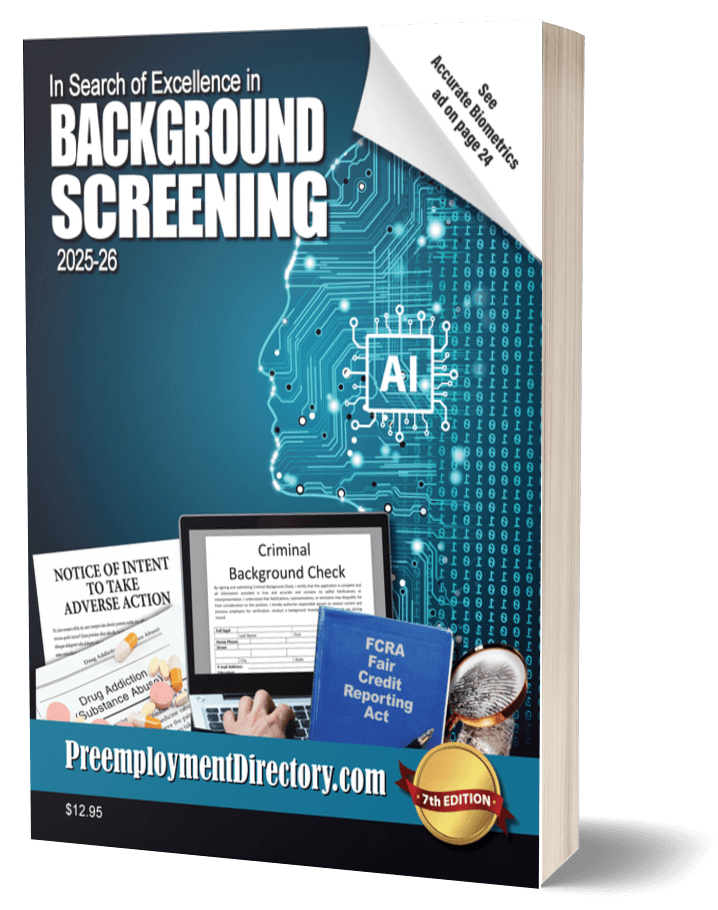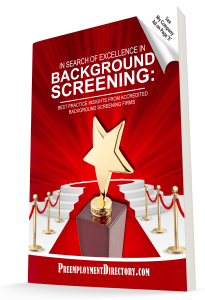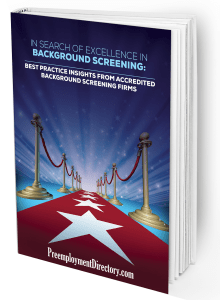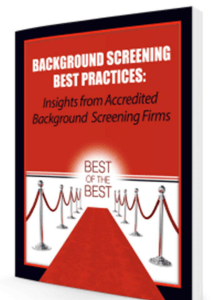
Menu

The Professional Background Screening Association offers accreditation programs for background screening firms also known as consumer reporting agencies (CRAs) located in the United States and for background screening firms outside of the United States. Governed by a strict and thorough set of professional standards of specified requirements and measurements, the PBSA’s Background Screening Organization Accreditation Program (BSOAP) has become a widely recognized seal of achievement that brings recognition to background screening organizations.

By Derek Hinton, President, CRAzoom and W. Barry Nixon, COO, PreemploymentDirectory.com
The Professional Background Screening Association (PBSA) offers an accreditation program for US background screening firms. The accreditation process includes a written protocol that addresses 68 different specific practices. To earn the accreditation a firm must demonstrate initial and ongoing compliance with the accreditation standard. Compliance is demonstrated through rigorous desk and on-site audits, all of which are completed by an independent third-party auditor. This article answers the top questions that HR Managers have about PBSA’s Accreditation Program.
By: Derek Hinton, CEO, CRAzoom and W. Barry Nixon, COO, PreemploymentDirectory.com
There are now over 130 PBSA Accredited firms in the US. And the General (International) Accreditation is kicking in.
There are few reliable statistics on how many employment screening firms there are in the United States. Estimates range from 2000-3000. Many of these are very small, perhaps only doing screens for a few employers.
There are almost 450 screening firms that are currently members of PBSA. Some of these firms are primarily tenant screening with employment screening a small percentage of their business. So, the 130 firms that have been accredited have reached a significant number for employers choosing their employment background screening provider.
Employers are increasingly sophisticated in choosing their employment screening partner. They understand that while the industry is highly regulated with the Fair Credit Reporting Act (and state versions of the act), the Driver Privacy Protection Act (and state versions of this act) there are no licensing requirements to become an employment screening firm outside of some states’ requirements that employment screeners have a private investigation license. The thought that the local nail salon probably has more licensing requirements than their employment screening partner has made employers look for other, more objective means in which to qualify their employment screening partner.
PBSA Accreditation has become the top objective means in which to evaluate employment screening firms. Several years ago, PBSA accreditation was a “feather in the cap” of employment screeners that put them above most of their competitors. That has not changed, but PBSA Accreditation is increasingly becoming a minimum standard when employers choose their employment screening partner. The “Are you a Member of PBSA” question on ‘Request for Proposals’ has evolved into “Are you Accredited by the PBSA.”
Insurers Recognizing Accreditation Value
Insurers are increasingly looking at PBSA Accreditation status when underwriting liability insurance for employment screening firms. Accredited companies are eligible for underwriting credits/savings from more insurers. The employment screening arena is highly litigious and settlements can be huge. While the accreditation process is necessarily aimed at employment screener protection, several sections of the PBSA Accreditation deal with client education for their processes. And so, an employment screener that has policies and procedures for client education is less likely to become ensnared in client litigation in addition to the decreased likelihood of becoming involved in litigation because their policies and procedures were lacking.
PBSA Accreditation Standard in Process of Revision
In late 2023, the PBSA published a proposed new standard for PBSA Accreditation. This is version 3.0 of the standard. There are many changes, but few substantive changes changes from version 2.0. Version 2.0 was a substantive change from the old.
Conclusion
Earning accreditation is a difficult and arduous process for background screening firms, however, employers that engage the services of accredited background screening firms stand to gain the best possible results.
Choosing an accredited firm is a cost-effective way for employers to stay informed about and navigate the maze of legal requirements that impact background screening without needing to overly invest in staff and resources. This is particularly important as we continue to see growth in FCRA lawsuits, the influx of new ‘ban-the-box’ legislation and numerous state or local requirements. Of course, using an accredited background screening firm is not a guarantee that you will not be sued or made a target of an enforcement action, but if you get pulled into the fray you want to have the best possible players on your team.
In the end, using an accredited background screening firm is your best bet in your effort to hire the best talent to meet your business needs and to provide a safe workplace. Accreditation is being achieved by more employment screeners, many insurers have accepted the value of accreditation, and the accreditation program itself is raising the bar.
Source: thePBSA.org, This article was not written by PBSA. For detailed and specific information on the accreditation process visit thePBSA.org.
About the Authors
 Derek Hinton began his career with a CRA in 1984 and is President of CRAzoom, a company that has assisted many CRAs become PBSA Accredited, and CrimApollo, a criminal record assessment and EEOC compliance service.
Derek Hinton began his career with a CRA in 1984 and is President of CRAzoom, a company that has assisted many CRAs become PBSA Accredited, and CrimApollo, a criminal record assessment and EEOC compliance service.

Barry Nixon is the COO of PreemploymentDirectory.com, the leading background screening information portal on the worldwide web. He co-authored Background Screening Investigations: Managing Hiring Risk from a HR and Security Perspective and is publisher of The Background Buzz, The Global Background Screener, and the Annual Background Screening Industry Resource Guide.
By Derek Hinton, President of CRAzoom
The quality of the goods or services you offer to your clients is likely one of your top concerns. And it’s not just the particular widget or service you provide. Many things go into your clients’ quality experience and perception. Your firm’s internal employee screening, training, customer service, after-the-sale policies and experience all contribute to a clients’ quality experience and perception.
It is important to understand that quality does not necessarily mean the most expensive, and it may not even mean the best. For example, if an automaker made a titanium bumper guaranteed to last 100 years without dent or scratch would you pay an additional $20,000 for it? It’s demonstrably higher quality. For the goods and services, you offer, would your clients pay that kind of premium? Probably not unless that is singularly important to them.
Your employment screening firm provides you with information. To ensure quality, they must recruit, screen, hire employees who have integrity and train them to fully understand and perform their work to the level of standards they have implemented. They must be compliant with legal requirements, provide ongoing education to their clients, and have written policies and procedures that institutionalize knowledge rather than have it reside in a few key workers’ heads. This way if a worker leaves the company that ensure the knowledge of standards and how to perform the work stays in the firm. They must not only have the right technology but also must make sure it is easy to use. Given the highly personal and confidential nature of the information they are providing it is essential that they provide the highest level of security. They must vet and monitor their vendors and subcontractors to ensure they also meet their standards, maintain high security and provide maximum protection of personal information. Maintaining high standards of delivery, applying the right and easy-to-use technology and maintaining high-level information security protocols may make their delivery a bit slower–but will deliver a higher sustained level of accuracy. Remember “Long after a slower delivery date is forgotten, the memory and pain caused by a faster delivery of inaccurate information will live on.”
PBSA Accreditation Directly Addresses Quality
How can a company evaluate an employment screening firm’s quality before using them? One objective measure is to check their PBSA Accreditation status. The PBSA Accreditation program addresses each of the items above:
An accredited employment screening firm must have detailed written policies and procedures covering all these areas and demonstrate through an onsite audit full compliance by an independent auditing firm.
This is all extremely valuable, but how does the accreditation standard directly address quality? How can you know that the information you are currently receiving is accurate? While an applicant may certainly let you know if your employment screening firm erroneously reported a criminal offense, they may be less likely to inform you if their criminal history is missed. Either way, receiving wrong information is not receiving the quality you need.
According to the Consumer Finance Protection Bureau which enforces the Fair Credit Report Act (FCRA) the critical quality measurement for an employment screening firm is to provide “maximum possible accuracy.” It’s Federal Law and failure to abide by this standard affects the screening firm as well as you.
The PBSA Standard requires employment screening firms who wish to be accredited to specifically address quality in the information they provide in three different clauses (employment screening firms are formally known as “Consumer Reporting Agencies” or “CRAs” as used below) :
So, a percentage of every information gathering and reporting service an accredited firm performs for you is double-checked. That doesn’t mean looking at what was provided twice, but going to the source using a different employee or vendor and comparing the results with what was received the first time.
For example, they will go to the county using a different supplier or court clerk and pay for the record again. When they receive that record, they compare that with what was originally obtained/reported. If there is any difference, job one is to determine why and fix the issue if there is one and inform the client. The entire investigation, and if need be, the remedy must be documented.
For reference checks, a certain percentage is done again, using a different employee or source if available. If one reference says the employee was terminated and the other says the employee quit the job, there’s an issue and the same protocol is followed as with a criminal record.
For accredited firms, discrepancies happen, but are rare. The required due diligence on employees and partners before using them helps, but as former President Reagan is credited with saying, “Trust, but Verify.”
Other services differ some but still have quality protocols. For example, you may order driving records. An accredited firm may not contact the county sheriff to verify the speeding ticket. But an accredited firm will take a percentage of driving records you ordered and ensure that the identifying information you provided was what was sent to the Department of Motor Vehicles and that the information they provided pertained to whom was about and further, that was the information provided back to you. This is a systems check. Federal, State, and Local IT systems have been known to develop bugs. An accredited firm monitors that.
As you might suspect, re-ordering information for which there is no paying client is expensive. But failing to uncover a systemic (or random) issue that bars “maximum possible accuracy” can be more expensive for all parties concerned.
Conclusion
The quality of your current employment screening partner is difficult to measure. It is almost impossible to evaluate the quality of a company you have not used. It is most certainly not a function of the size of the employment screening firm. PBSA accreditation can (and has) been achieved by companies with 3 employees and thousands of employees.
The most important and apparent indicator of quality may be the employment screening firm’s PBSA Accreditation status. This is not to say an accredited firm will not goof, or that an unaccredited firm cannot provide quality service. But with objective, empirical benchmarks of quality hard to ascertain, the PBSA accreditation standard is an excellent pre-qualifier to check when choosing an employment screening partner.
ABOUT THE AUTHOR

Derek Hinton is President of CRAzoom, a company used by the majority of CRAs to achieve and maintain PBSA Accreditation. In addition, Derek consults as a fractional Compliance Officer for CRAs, has created “plug and play” packages for CRAs being audited by their vendors, and is the owner and creator of CrimApollo, a criminal record assessment tool for employers and CRAs. Derek is also the managing partner of NameGrades, a program that assesses the commonality of names in the United States.
Derek began his career working for a CRA in 1984 and held positions in communications, product and market development, marketing, lobbying, legal, and compliance. From 2002 to 2008, Derek was the author of three editions of The Criminal Records Manual, described by a reviewer as “the definitive book on criminal records…for anyone involved in background screening, human resources, security or employment law.” Derek also acts as an expert witness in matters of employment screening.
The BSOAP provides a detailed process for evaluating and improving internal operating procedures that every CRA, and their clients, benefit from. Accredited CRAs have made a commitment to uphold and deliver the highest level of industry standards. To become accredited, organizations must pass both a desk audit and rigorous onsite audit, conducted by an independent auditing firm, of its policies and procedures in six critical areas:


Compliance is demonstrated through rigorous desk and on-site audits, all of which are completed by an independent third-party auditor. Firms must document each of their policies and processes as required in each of the areas within the Standard and demonstrate visible compliance with their policies to the auditor. Accreditation lasts for five years, after which time firms are required to re-complete the process if they wish to remain accredited.
To become accredited firms must demonstrate initial and ongoing compliance with the accreditation standard.

The PBSA accreditation program was created for two primary purposes:
Accredited firms have agreed to abide by industry established practices as defined by the Background Screening Organization Accreditation Program (BSOAP). They have documented these practices and they have demonstrated adherence through both desk and onsite audits by an independent auditor.
Source: thePBSA.org

Derek Hinton
President, CRAZoom
Derek Hinton is President of CRAzoom, a company used by the majority of CRAs to achieve and maintain PBSA Accreditation. He is a member of the PBSA CRAzoom can help you get accredited faster, at less cost, and radically increase the odds of your success the first time you apply. Derek has studied every Background Screening Credentialing Council (BSCC) of PBSA Accreditation Clause/Sub-Clause and created a workbook package that explains the standard, details exactly what you must do to achieve compliance and provided a model response for each criterion. He also provides supplemental materials that include everything you need to fully understand the accreditation process and to earn accreditation. Derek is the ‘go-to’ guy for information about getting accredited in the background screening industry.







